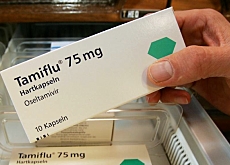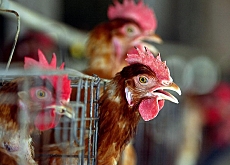Pharmacists and doctors told to calm flu fears

Switzerland's medical and pharmacists' associations have asked their members to calm public fears of bird flu and to discourage purchases of Roche's Tamiflu.
They say media coverage is to blame for convincing the Swiss that they need to stockpile the prescription drug at home when there is no sign of a human pandemic yet.
Although people aren’t queuing outside pharmacies yet, demand in Switzerland for the Swiss pharmaceutical giant’s antiviral treatment has risen on fears of a bird flu pandemic, fuelled by the arrival of the virus on Europe’s shores.
The European Commission confirmed over the past week that the avian H5N1 virus, which experts believe could evolve into a strain capable of killing tens of millions of people worldwide, was found in birds in Turkey and Romania.
To mitigate this threat, countries in Europe have been urged to monitor bird populations and to stockpile Tamiflu.
The antiviral drug will be the first line of defence in the event of a pandemic while scientists prepare an effective vaccine, which could take months to develop.
But the arrival of bird flu has convinced people in many countries they need to get their hands on Tamiflu now.
With no vaccine available, the treatment – recommended by the World Health Organization – has been flying off pharmacy shelves in France, Germany and Belgium, where the virus has not even been sighted.
Stockpile
In Switzerland, the drug is also in demand in some regions. Yet pharmacists, who should be pleased with a potential rise in sales, say people are worried for the wrong reasons.
Dominique Jordan, president of the Swiss Pharmacists’ Association, told swissinfo that people need not buy Tamiflu.
“There is a kind of panic among the population, and in Switzerland there is no reason to panic,” he said. “If there is a problem today, it is because some media have used this fear of bird flu to boost their market share.”
To calm some of these concerns, the pharmacists’ association has written a joint letter with the Swiss Medial Association to remind its members there is no reason to prescribe Tamiflu for the time being.
The letter adds that for the time being that humans have been rarely affected by avian influenza.
Daniel Koch of the Federal Health Office agrees that the population should remain calm.
“Governments need to be able to stockpile this medication,” he said. “There is no reason for individuals to get it now because it should only be taken if there really is a threat of a pandemic – and first of all by those affected by the virus.”
While pharmacists have a financial incentive to sell medication, Jordan says they also have other responsibilities.
“We are a medical profession,” he said. “It’s true we have to sell to make a living, but we have to ensure the products we distribute don’t cause any harm.”
The Federal Health Office warns that although Tamiflu is the only recommended medication of its type on the market today, it should only be taken under medical supervision given its potential side effects – which include nausea, vomiting, bronchitis, insomnia and vertigo.
Right information
The pharmacists’ association wants to ensure now that people are properly informed about bird flu and the real risk of a pandemic.
“The population has been given so much contradictory information that people don’t know what to believe,” Jordan told swissinfo. “We are trying to coordinate our message with the Federal Health Office and doctors so that people realise there is no reason to panic.”
Others measures include posters inside pharmacies informing people why they shouldn’t purchase Tamiflu.
Jordan says that a typical problem faced by pharmacists is that many customers don’t realise Tamiflu is not a vaccine but a medication with limited effectiveness to be taken if they come down with flu symptoms.
The pharmacists’ association has also pointed out that Tamiflu may be of no use if and when the bird flu virus mutates and becomes a threat to the wider population.
The authorities, which also want people to stop worrying, have taken what they believe are sufficient measures for the time being.
“Switzerland has a stockpile that could be used for 25 per cent of the population, which is what we estimate is required if a pandemic breaks out,” Koch told swissinfo. “It would be enough to treat all those who need it.”
swissinfo, Scott Capper
Outbreaks of H5N1 avian influenza began in parts of southeast Asia in mid-2003.
So far, around 150 million birds have died during the outbreaks or been destroyed.
The virus is considered entrenched in parts of Vietnam, Indonesia, Cambodia, China, Thailand, and possibly Laos.
Human cases have been confirmed in four countries: Vietnam, Thailand, Cambodia, and Indonesia.
Bird flu has caused at least 65 deaths in Asia, mostly people who have come into contact with birds.
The virus was detected in Russia and Kazakhstan this summer, and in Turkey and Romania in the past week.
To hinder the spread of the disease, Switzerland has banned imports of poultry products from countries affected by the virus, including Turkey and Romania this past week.
The Federal Health Office has recommended that people working in close proximity with poultry get the normal flu vaccination.
Last month, the Swiss authorities also began monitoring migrating birds for the presence of avian influenza.

In compliance with the JTI standards
More: SWI swissinfo.ch certified by the Journalism Trust Initiative











You can find an overview of ongoing debates with our journalists here . Please join us!
If you want to start a conversation about a topic raised in this article or want to report factual errors, email us at english@swissinfo.ch.